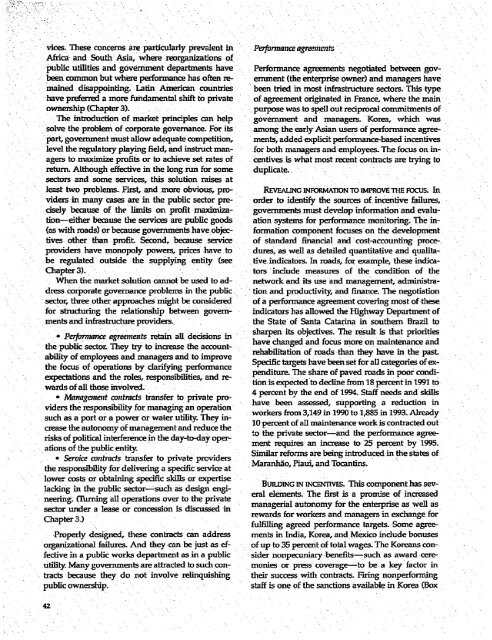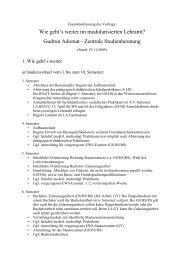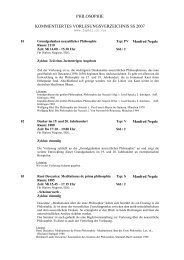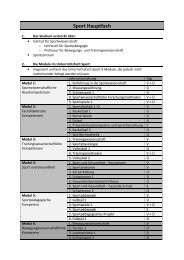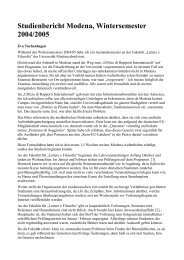ASi" kUCTURE FlOR DEVELOPMENT
ASi" kUCTURE FlOR DEVELOPMENT
ASi" kUCTURE FlOR DEVELOPMENT
Create successful ePaper yourself
Turn your PDF publications into a flip-book with our unique Google optimized e-Paper software.
vices. These concerns are particularly prevalent in Performance agreemcn2ts<br />
Africa and South Asia, where reorganizations of<br />
public utilities and goverunment departments have Performance agreements negotiated between govbeen<br />
common but where performance has often re- emment (the enterprise owner) and managers have<br />
mained disappointing. Latin American countries been tried in most infrastructure sectors. This type<br />
have prefenred a more fundamental shift to pnvate of agreement onginated in France, where the main<br />
ownership (Chapter 3).<br />
purpose was to spell out reciprocal commitnents of<br />
The introduction of market principles can help govenment and managers. Korea, which was<br />
solve the problem of corporate govemance. For its among the early Asian users of performance agreepart,<br />
government must allow adequate competition, =ments, added explicit performance-based incentives<br />
level the regulatory playing field, and instruct man- for both managers and employees. The focus on inagers<br />
to maximize profits or to achieve set. rates of centives.is what most recent contracts are trying to<br />
return. Although effective in the long. run for some duplicate...<br />
sectors and some services, this solution raises at<br />
least two problems.. First, and more obvious, pro- REVEALING INFORMATION TO IMPROVE THE FOCUS. In<br />
viders in many cases are in the public sector pre- order to identifv the sources of incentive failures,<br />
cisely because of the limits on profit maxiiiza- govermnents.must develop information and evalution-either<br />
because the services are public goods ation systems for performance monitoring. The in-<br />
(as with roads) or because governments have objec- formation component focuses on the development<br />
tives other than profit. Second,.because service of standard financial and cost-accounting proce-.<br />
providers have monopoly powers, prices have to dures, as well as detailed quantitative and qualitabe<br />
regulatedc outside the supplying entity (see tive. indicators. In roads, for example, these indica-<br />
Chapter 3).-<br />
tors include measures of the condition of the<br />
When the market solution cannot be used to ad- network and its use and management, admhnistradress<br />
corporate governance problems in the public. tion and productivity, and finance. The negotiation<br />
sector, three.other approaches miight be considered of a performance agreement covering most of these<br />
for structuring the relationship between govern- indicators has allowed the HIghway Department of<br />
ments and infrastructure providers..<br />
the State of Santa Catarina in southern Brazil to<br />
P r aee retain al dcso in . ..................... sharpen its objectives. The result is that priorities<br />
Perfornmace agreemnents retain all decisions m hv hne n ou oeo aneac n<br />
the public sector. They try to increase the account- have changed and focus more on maintenance and<br />
ability of employees and managers and to*<br />
rehabilitation of roads than they have in the pasL<br />
abilty or emnployees and managers and to improve<br />
the<br />
the<br />
focus<br />
focus<br />
of<br />
of<br />
operations<br />
operations by<br />
b. clarifying<br />
clarifying<br />
pe.<br />
performance.--<br />
,Specific orinance<br />
targets have<br />
--<br />
been set for all categories of ex-<br />
expectations and the roles, responsibilities, and re penditure. The share of paved roads i poor condiwards<br />
of all those involved. ~ - tion is expected to decline from 18 percent in 1991 to<br />
4 percent by the end of 1994. Staff needs and skills<br />
Manage7ne12t con2tractstrnEropvaer-<br />
i<br />
-de respo the t fr managin g private - have been assessed, supporting a reduction in<br />
viders the responsibfllty for managmgz an operation--- -<br />
an opera,ti workers from 3,149 in 1990 to 1,885 in 1993. Ahready<br />
such as a port or a power or water utly Thyisucrasethe<br />
auportonapomy m of agenty andreducether m- 10 percent of all maintenance work is contracted out<br />
crease the autonomy of management and reduce the - -<br />
risks of political interference in the day-to-day oper- to the private sector-and the performance abgree<br />
ations of the public entity- ment requires an increase to 25 percent by 1995.<br />
- Service contracts transfer to private providers Simflar reforms are being introduced in the states of<br />
*Service aoufmcts transfer to private providers ._ ...- -<br />
s<br />
the responsiblfity for<br />
,.<br />
delivering<br />
, . .,-<br />
a spedfc<br />
.<br />
service<br />
. hS~~~~aranh5o,<br />
at<br />
Piaui, and TocanEns.<br />
lower costs or obtaning specific skills or expertise B - Nc<br />
.. - . . . . , . . ~~~~BUILDING IN INCENTTVEs. This component has sevlacking<br />
in the public sector-such as design engi& e<br />
neering. (Turning all operations over to the private m gal autonomy forst enterprise as welleas<br />
sector under a lease or concession is discussed in renaris wk for a mnaersnsexange fo<br />
Chapter - 3.) . ~~~~~rewards for worlcers and managers in exchange for<br />
Chapter 3..<br />
fulflling agreed performance targets Some agree-<br />
-Properly designed, these contracts can address ments in India, Korea, and Mexico iiclude bonuses<br />
organizational failures. And they can be just as ef- of up to 35 percent of total wages. The Koreans confective<br />
in a public works departnent as in a public sider nonpecuniary benefits-such as award cereutility.<br />
Many governments are attracted to such con- monies or press coverage-to be a key factor in<br />
tracts because they do not involve relinquishing their success witlh contracts. Firing nonperforming<br />
public ownership.<br />
staff is one of the sanctions available in Korea (Box<br />
-42


